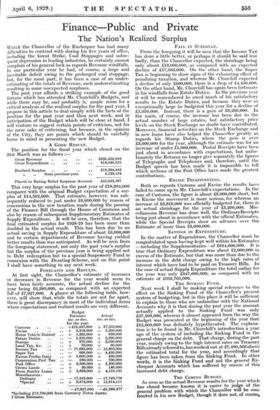FALL IN SUPERTAX.
From the foregoing it will be seen that the Income Tax has done a little better, or perhaps it should be said less bidly, than the Chancellor expected, the shrinkage being only about £13,000,000; as compared with an expected decline of 117,683,000. On the other hand, the Super Tax is beginning to show signs of the exhausting effect of penalizing taxation, and wheriai Mr. Churchill expected a decline of only £600,000, there is a drop of £4,450,000. On the other hand,_ Mr. Churchill has again been fortunate in his windfalls from Estate Ditties. In the previous year it will be remembered he owed' Much of his satisfactory results to the Estate Duties, and because they were so exceptionally large hi budgeted this year for a decline of £5,310,000. Instead, there is a gain of £8,260,000. In the main, of course, the increase has been due to the actual number of large estates, but satisfactory price levels on the Stock Exchange no doubt have contributed. Moreover, financial activities on the Stock Exchange and in new loans have also helped the Chancellor greatly as regards his Stamp Duties, where the gain is over £3,000,000 for the year, although the estimate was for an increase of under /1,000,000. Postal Receipts have been just about in accordance with expectations, but unfor- tunately the Returns no longer give separately the figures of Telegraphs and Telephones and, therefore, until the Budget speech has been made it is impossible to tell which sections of the Post Office have made the greatest contributions.






































 Previous page
Previous page